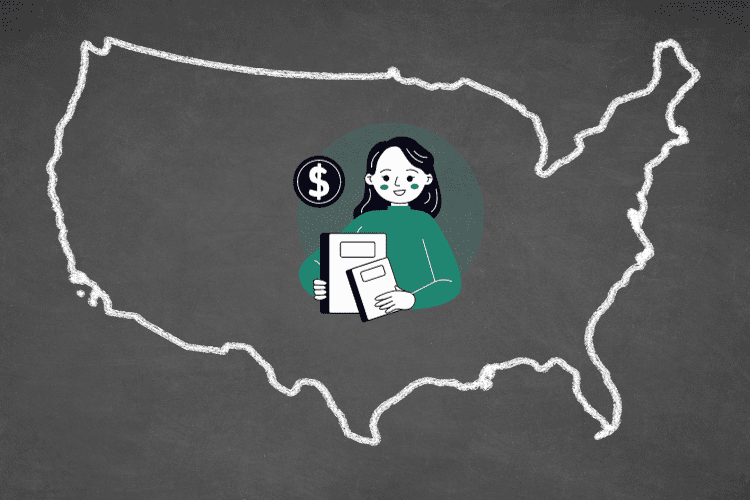23 States That Require a Financial Literacy Education To Get a Diploma

If you follow our site, you know the importance of financial education. The earlier we start understanding how to manage our money properly, the better prepared we’ll be to acquire our goals in life. The public school system has become aware of this, and now, more states require financial literacy education to graduate.
The days of learning how to balance a checkbook before graduating high school are gone. Financial education is essential with more Americans getting deeper into debt and with little to no savings. As of the third quarter of 2023, total household debt in the U.S. rose by 1.3% to $17,29 trillion. Everything increased: mortgage balances, credit card balances, student loan balances, and auto loans. The average household debt is over $103,000.
If it’s important that your child graduates with a better understanding of financial literacy than most, you should know the states that require financial literacy to graduate from high school. Is your state on the list?
Which States Require a Financial Literacy Education To Get a Diploma
Currently, more than half the states in the U.S. (23) require some type of personal finance class to graduate from high school.
Alabama – Launched a course in the 2013-14 school year. Its Career Preparedness course is a requirement for graduation. Forty-four percent (44%) of the course’s hours are dedicated to personal finance topics.
Connecticut – Starting with the class of 2027, high school graduates must complete a personal financial management and financial literacy class. The course must cover banking, investing, savings, handling personal finance matters, and the impact of using credit cards and debit cards.
Florida – Starting with the current high school graduating class (2023-24), the Dorothy L. Hukill Financial Literacy Act requires students to take a half-credit financial literacy course.
Georgia – Starting with the 2024-25 school year, juniors and seniors must take at least a half-credit financial literacy course to graduate. That credit can count for a math, social studies, or a different required elective credit.
Indiana – Starting with the incoming freshmen of 2024 (graduating class of 2028) all public, charter, and state-accredited nonpublic schools must complete a personal financial responsibility course to graduate.
Iowa – Starting with the graduating class of 2023, students must take half a financial literacy unit to graduate.
Kansas – Starting with the graduating class of 2027, the Kansas State Board of Education requires all graduates to take a half-credit financial literacy course.
Louisiana – Starting with the 2026-27 school year, graduating students must complete a one-unit financial literacy course.
Michigan – House Bill 5190 requires students starting eighth grade in 2023 to take a half-credit financial literacy course before graduating.
Minnesota – All students entering high school as early as 2024 must successfully complete a personal finance course in the 10th, 11th, or 12th grade. In addition, personal finance teachers must have a field license or out-of-field permission in agricultural education, business, family and consumer science, social studies, or math.
Mississippi – Starting with the graduating class of 2022, students must take the College and Career Readiness course to graduate. The year-long course covers everything from choosing a career path and setting goals to paying for college. Financial literacy is one of the eight units covered in the course and is worth a half-credit.
Missouri – In 2017, its state graduation requirements were updated for students to take a stand-alone, half-credit financial literacy course. The requirements started in the 2019-20 school year.
Nebraska – Starting with the 2023-24 school year, all public high school students must take at least one five-credit course in financial literacy to graduate.
New Hampshire – In 2022, House Bill 1671 was signed to require high school students to complete a financial literacy course. This started with the 2023-24 school year.
North Carolina – Starting with the 2020-21 school year, high school students were bound by House Bill 924 to take the full-credit Economics and Personal Finance course to graduate. The course focuses on economics, personal finance, financial planning, how to be a wise consumer, and other topics.
Ohio – As of July 2022, all graduates must take a one-half-unit financial literacy course to graduate.
Oregon – Bill 3 requires students to complete a half-credit personal finance course. This goes into effect with the graduation class of 2027.
Rhode Island – Section 16-22-13 of the Rhode Island General Laws requires the graduating class of 2024 and beyond to demonstrate proficiency in financial literacy before they graduate. There are multiple ways they can meet this requirement. They can take a financial literacy course aligned with the state’s standards or pass multiple courses that include the required financial literacy content. In addition to that, students can also meet requirements through stated local education agencies.
South Carolina – The South Carolina Department of Education updated high school graduation requirements to include a half-credit personal finance course within existing credits.
Tennessee – Graduating seniors have been required to take a half-credit financial literacy course since the class of 2013.
Utah – Financial literacy has been in place since 2003. Firstly, Senate Bill 154 required a one-semester financial literacy course for graduation. The following year, the Utah State Board of Education required a one-semester General Financial Literacy (GFL), implemented with the 2008 graduating class. Every high school student must take a half-credit GFL course to graduate.
Virginia – Since the 2011-12 school year (for students who entered 9th grade), the Virginia Board of Education required students to complete a stand-alone, full-credit economics and personal finance course.
West Virginia – Starting with the 2024-25 school year, every high school student must complete a half-credit personal finance course to graduate.
The Bottom Line
Whether they realize it or not, financial literacy is important to everyone. When students are allowed to become familiar with money management before they graduate high school, they learn financial concepts that will set them up early, giving them a headstart on being more responsible with their money.
While these principles may not immediately resonate with them, as they continue through life, they’re bound to recount some of those principles to eventually apply them to their lives to make better financial decisions sooner rather than later.
Read more:










